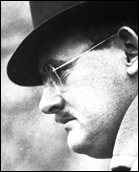Doc Savage: Death's Dark Domain (38 page)
Read Doc Savage: Death's Dark Domain Online
Authors: Will Murray Lester Dent Kenneth Robeson
Tags: #Action and Adventure

“Indisposed,” replied Doc. “And if you are wise, you will dismantle your warbats.
You have nothing more to battle over. Peace is your only sane alternative.”
Prime Minister Ocel looked crestfallen. He collapsed into a shrunken shell of his
former self. Then, mustering the last remnant of his will, he squared his bony shoulders.
“I will defend Egallan sovereignty with my last breath,” he creaked. “Ultra-Stygia
will never be Tazan! It belongs to us!”
The night wind carried his words away. There was no other response. Ocel looked around,
as if in anticipation of rescue. None materialized. He blinked. His mouth squeezed
shut.
“Your war appears over,” Doc Savage told him.
“What am I to do now?” Ocel squeaked thinly.
“Here’s a tip,” said Long Tom. He reached into his pocket and tossed the man a half-dollar.
When Prime Minister Ocel caught the coin, Long Tom clicked his heels together.
The result was that the cadaverous man had a taste of what sitting in an electric
chair must feel like. He danced a jig that was painful to behold. Contortions threw
him to the ground. There, his long limbs jerked and twitched. Boris Ocel found himself
unable to release the electrified coin until Long Tom separated the copper contacts
on the inner sides of his shoes.
“Keep the change,” finished Long Tom.
They left him there, returning to their plane. No alarm was sounded. No one attempted
to intercept them.
THE bronze amphibian stood in the snowbound pasture unharmed. A few warbats lay scattered
in the crust of snow, damaged beyond repair. They had fallen out of the sky. All signs
pointed to the ferocious action of superfirer rounds.
“We had us a little fracas,” Monk explained when he threw the cabin door open.
“Miss any?” inquired Doc.
Monk grinned broadly. “A few got through. But it was like shootin’ bats in a barrel.
The pilots bailed out and ran off like the Count Dracula himself was chasin’ ’em.”
Doc closed the door, saying, “We are taking off at once.”
From his seat, still utterly invisible, Simon Page’s forest-green eyes searched their
faces. “Where is Fiana?”
Doc told him, “Miss Drost has elected to remain behind, for good.”
The emerald orbs squeezed shut. “I—I can’t blame her. Look at me.”
“Your condition will wear off, as you know. As for the coat of hair, it can be shorn.”
Page’s voice seemed to grimace. “Like a damn sheep.”
Doc pointed out, “Electrolysis treatments should ensure that none of it grows back.
That may not even be necessary, however.”
Doc dropped into the control bucket, and started the engines. Taking off was an exercise
in nail-biting, but once again the bronze man’s consummate flying skill lifted them
safely into the sky.
Back in the air, Ham Brooks asked several questions about what had transpired. He
did not get all the answers he sought. Doc Savage was unusually tight-lipped.
Finally, Ham inquired, “What about the darkness machine?”
“We will dispose of it over the ocean,” said Doc. “It is too dreadful to be allowed
to exist.”
Once they reached the Black Sea, the bronze man was as good as his word. Monk took
the controls, while Doc Savage carried the bulky device to the cabin door. This he
knocked open. Without hesitation, he flung the thing into the darkling waters. It
struck, disturbed the shimmering moonglade briefly, then was lost.
The scientific secret of generating blindness would thereafter survive only in the
bronze man’s amazingly retentive mind.
Regaining the controls, Doc Savage pointed the amphibian west, toward Europe and America.
An hour along, Long Tom turned from the radio to say, “All seems quiet. I think the
appetite for blood has left the war makers.”
Doc nodded. “It is over,” he said quietly.
Monk spoke up. “Say, now that we’ve cleared this up, should we check in on Pat?”
“Pat should be fine,” Doc advised.
“Won’t hurt to hear her voice after all this. We haven’t exactly come across a lot
of babes on this trip.” Throwing a knowing glance in the direction of Ham Brooks,
he added, “Unless you count Ham’s latest flame, Countess Olga.”
Ham Brooks purpled, but refrained from offering a rejoinder. He looked as if he might
explode. When he wasn’t looking, Habeas the pig stole up and made off with his cane,
entirely unnoticed.
Taking over the radio, Monk dialed around until he got Pat on her private radio set.
He put her on the cabin speaker.
Pat greeted cheerily, “I hear you boys found yourself a nice little war.”
“And how!” Monk enthused.
“It’s over now,” Doc told her. “You sound well, Pat.”
“The doctors gave me a clean bill of health. I’ve been home for over a day.”
Grins of relief broke out over that welcome bit of news.
Pat’s pleasant voice crackled across the ether. “Say, Doc, exactly how much fun did
I miss out on this time?”
The bronze man was a long time in responding.
“On this trip,” he said somberly, “we met with no fun whatsoever.”
Lester Dent
 LESTER DENT had the good fortune to write his early Doc Savage novels during the period
LESTER DENT had the good fortune to write his early Doc Savage novels during the period
of classic movie monsters. The original
King Kong.
Boris Karloff in
Frankenstein.
Bela Lugosi as Dracula.
The Mummy.
No doubt he saw them all during their first runs. For some of Lester’s earliest pulp
stories, such as “The Sinister Ray” and “The Mummy Murders,” belonged to that pulp
sub-genre called “menace,” which was nothing more or less than a reflection of Hollywood’s
fascination with malevolent monsters during the Great Depression.
Knowing that his readers expected similar thrills in the pages of
Doc Savage Magazine,
Dent and his editors pitted the superhuman Man of Bronze against some of the most
monstrous foes imaginable. Out of the Dent typewriter came such fearful fantasies
as
The Sargasso Ogre, Brand of the Werewolf, The Squeaking Goblin, The Thousand-Headed
Man,
and what may be his masterpiece of menace,
The Monsters.
In the scientifically-based world Doc Savage inhabited, he never encountered a real
vampire, or battled an actual werewolf. But that was the point of his adventures.
Science was the greatest weapon against the mysteries of the unknown, and with the
right tools, mankind could overcome any foe, no matter how supernatural he seemed.
This theme threaded through the 1930s and ’40s, until in Doc’s final adventure,
Up From Earth’s Center,
the Man of Bronze was unexpectedly plunged into Hell itself, emerging unscathed,
if not victorious—which puts him in the same company as the great heroes of legend
and myth, going back to Gilgamesh, Osiris, Orpheus, Hermes, Hercules, Dionysus and
Odysseus. Nice company for a 20th century pulp hero.
Will Murray
 WILL MURRAY’S first brush with monsters came when he took in a double-feature of
WILL MURRAY’S first brush with monsters came when he took in a double-feature of
Mr. Roberts
and
Gorgo
back in 1961—keeping one anxious eye on the darkened orchestra pit where
things
were said to lurk. Not long after this, he began devouring the four-color creatures
offered in comic books such as
Tales to Astonish, Journey into Mystery, Amazing Adult Fantasy ,Strange Tales, Tales
of Suspense, Strange Adventures, Strange Suspense Stories, My Greatest Adventure,
Tales of the Unexpected, House of Secrets, Adventures into the Unknown, Forbidden
Worlds, Unknown Worlds, Mysteries of the Unexplored, The Incredible Hulk, Konga
and, of course,
Gorgo. Famous Monsters of Filmland
was in its glory.
Mad Monsters, Horror Monsters
and
Castle of Frankenstein
soon followed. Classic Science Fiction films saturated television, as did
The Twilight Zone
and
The Outer Limits.
It was the Age of Monsters.
It was during that wonderful time that the Aurora Plastics Company began releasing
their model kits based on the old Universal monster movies. Murray loved the atmospheric
box art as much as the cool kits themselves. A few years later, he again encountered
the anonymous artist behind those masterful illustrations. By that time, artist James
Bama was signing his work on Doc Savage covers as memorable as his moody monster work.
An interest in the adventures of Doc Savage superseded—but did not replace—Murray’s
fascination with monsters. It made perfect sense. The Man of Bronze was a monster
fighter of epic proportions.
Murray never lost his love for creatures of the unknown, and it was with great pleasure
that he wrote
Death’s Dark Domain,
a Doc Savage novel that revisits those wonderful legends—with a Kenneth Robeson twist!—and
is graced by a fantastic cover that evokes those Aurora kit boxes of yore.
Joe DeVito
 FEW things bring back memories as fun and as thrilling as good old-fashioned monsters,
FEW things bring back memories as fun and as thrilling as good old-fashioned monsters,
science fiction and adventure. Whether in a book, a movie, or—perhaps especially—a
story told at night with a bunch of childhood friends, it’s part of being a kid.
The classic Universal monster movies are well known. I particularly love The Creature
because of its Devonian Period overtones. And has anything ever bettered the Atomic
Age flicks of the 1950s, such as
The Day the Earth Stood Still, War of the Worlds, The Thing From Another World, Forbidden
Planet,
or
Invasion of the Body Snatchers?
The Aurora kits released in the 1960s are beloved by an entire generation. All of
us who grew up during that period (at least the guys) would be rich if we had a dime
for every bottle of Testor’s red paint bought during those years. I still remember
serious discussions regarding final details to be put on the monster kits. They inevitably
got around to: “…Yeah, it’s looking great, but it needs more blood!”
But creatures of the COLOSSAL variety have always fascinated me most. As a boy, dinosaurs
were the first giant “monsters” I encountered. I think seeing a
Tyrannosaurus rex
skeleton for the first time by a three year old would certainly qualify, don’t you?
The granddaddy of all colossal monster movies, the original
King Kong,
still has a grip on me a half century after my first viewing.
Mighty Joe Young;
the Rhedosaurus, Ymir, Cyclops and Talos from Ray Harryhausen’s oeuvre; Bert I. Gordon’s
giant humans in
The Cyclops, Amazing Colossal Man
and
War of the Colossal Beast; The Giant Behemoth, Godzilla,
all the giant bug movies et al.—were an integral part of my fantasy formation.
For me, the cover to
Death’s Dark Domain
is a visual homage to all of the above. Combining a Doc Savage adventure with gigantic
bat creatures and other quintessential SF/Fantasy details would paint quite a picture
in anyone’s imagination. I hope I caught a piece of it.
Mark O. Lambert
MARK O. LAMBERT has been a Doc Savage fan since 1975, discovering the movie edition
of Bantam’s
The Man of Bronze,
and later many other Doc novels, on the paperback shelf of the small-town pharmacy
where he regularly bought comic books. This was about the same time that Marvel Comics
was publishing its
Doc Savage
comic, and the Doc movie was released.